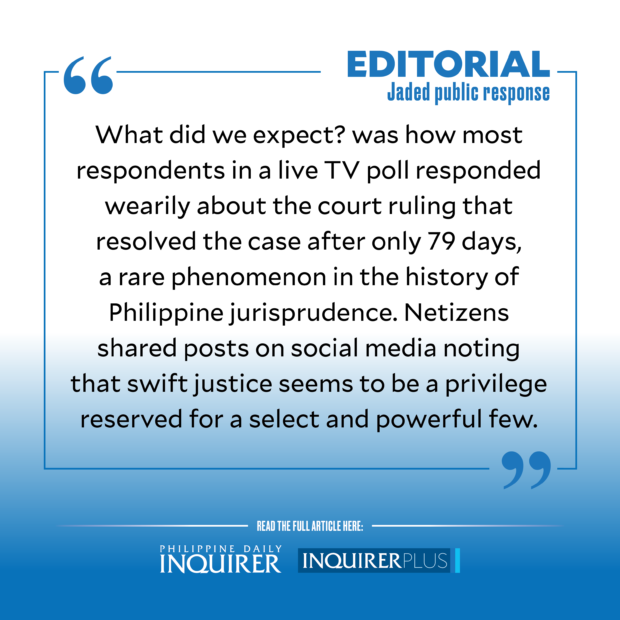Jaded public response
The muted outrage that greeted last week’s acquittal of Juanito Jose Remulla III on drug possession charges might well be the collective shrug of resignation that most people have when confronted with yet another case confirming the country’s arguably selective justice system.
A Las Piñas court has cleared the eldest son of Justice Secretary Jesus Crispin Remulla three months after his arrest, during a controlled delivery by members of the Philippine Drug Enforcement Agency (PDEA) of a package containing a kilo of high grade marijuana worth P1.3 million.
Well, what did we expect? was how most respondents in a live TV poll responded wearily about the court ruling that resolved the case after only 79 days, a rare phenomenon in the history of Philippine jurisprudence. Netizens shared posts on social media noting that swift justice seems to be a privilege reserved for a select and powerful few.
In a 34-page decision, Judge Ricardo Moldez II of the Las Piñas City Regional Trial Court Branch 197 cited several lapses on how the PDEA operatives handled the shipment, as well as the evidence’s dubious chain of custody. “The prosecution failed to show that [the] accused, by receiving the parcel, knew that he was also possessing illegal drugs,” the ruling said. The court said it had “serious reservations” on the integrity of the alleged two plastic bags of “kush” as there were no witnesses during the inventory and no records on how the package was handled, stored, and preserved.
The acquittal was a big slap in the face of the PDEA, with the court noting that “when there are glaring lapses or irregularities on the part of the law enforcers, the presumption of irregularity usually accorded to [them] is effectively destroyed or immediately negated.”
That the court might have decided the case on merit does not matter at this point; the perception of special treatment prevails, with initial circumstances putting in doubt Secretary Remulla’s earlier assurance that he would let the law take its course. In an ambush interview, the elder Remulla asserted that his son “had the right to be presumed innocent in the first place’’ and that he “did not interfere, in any way, with the process.” The younger Remulla still faces charges for the importation of illegal drugs and violation of the Customs Modernization and Tariff Act.
Why, people have asked, did the PDEA agents wait two days before presenting the Remulla scion to the public, and was careful to blur his mugshots, unlike other suspects who are even shown in handcuffs and garish prison garb? On the other hand, why would PDEA agents go out of their way to “set up” the younger Remulla, as his supporters have claimed, knowing that his being the son of a top official might torpedo their career?
It doesn’t help that one of Remulla’s counsel, Pearlito Campanilla, has insisted that the swift resolution of the case wasn’t extraordinary, and was according to Supreme Court guidelines that provided a 75-day trial period. “This is not a court of public opinion,” the lawyer said. “We have a legal system that if you are accused, you will undergo trial, you will present evidence and witnesses, and you will be judged,” Campanilla added, conveniently ignoring the fact that Remulla’s case stands out as an anomaly to the snail-paced justice system in the country.
Senate Minority Leader Aquilino Pimentel Jr., who said he had expected the acquittal because of PDEA’s lapses, commended the court for the speedy resolution of the case, but expressed hope that this would also happen to others facing charges. Other civil society groups have expressed the same sentiment, with former Bayan Muna party list representative Carlos Zarate lamenting how “thousands, mostly poor, were killed in the government’s bloody ‘war against drugs’ and were not even given the same chance at due process.”
Albay Rep. Edcel Lagman, meanwhile, bewailed the nearly six years that former senator Leila de Lima has been detained while her drug-related case appears to be “stranded in a dark tunnel of injustice.” Although the senator has maintained that the charges based on the testimony—since recanted—of convicted felons were politically motivated because of her criticism of the Duterte administration’s brutal drug war, her trial has dragged on. The prosecution further delayed the resolution with its move to block testimony of the witnesses who have recanted, and repeatedly questioning the impartiality of the judges handling the different cases.
At the same time, noted the National Union of Peoples’ Lawyers, Remulla’s swift acquittal “demonstrates that courts are capable of quickening their pace in resolving cases.” It’s definitely a challenge that the courts must take up if only to restore the people’s fading trust in the judicial system.
For now, as the elder Remulla rejoices that “justice [has been] served” his son, the jaded public response to the court ruling should spur him to make sure that justice is served as expeditiously to nameless others who are caught in the country’s notoriously stolid legal processes.





















